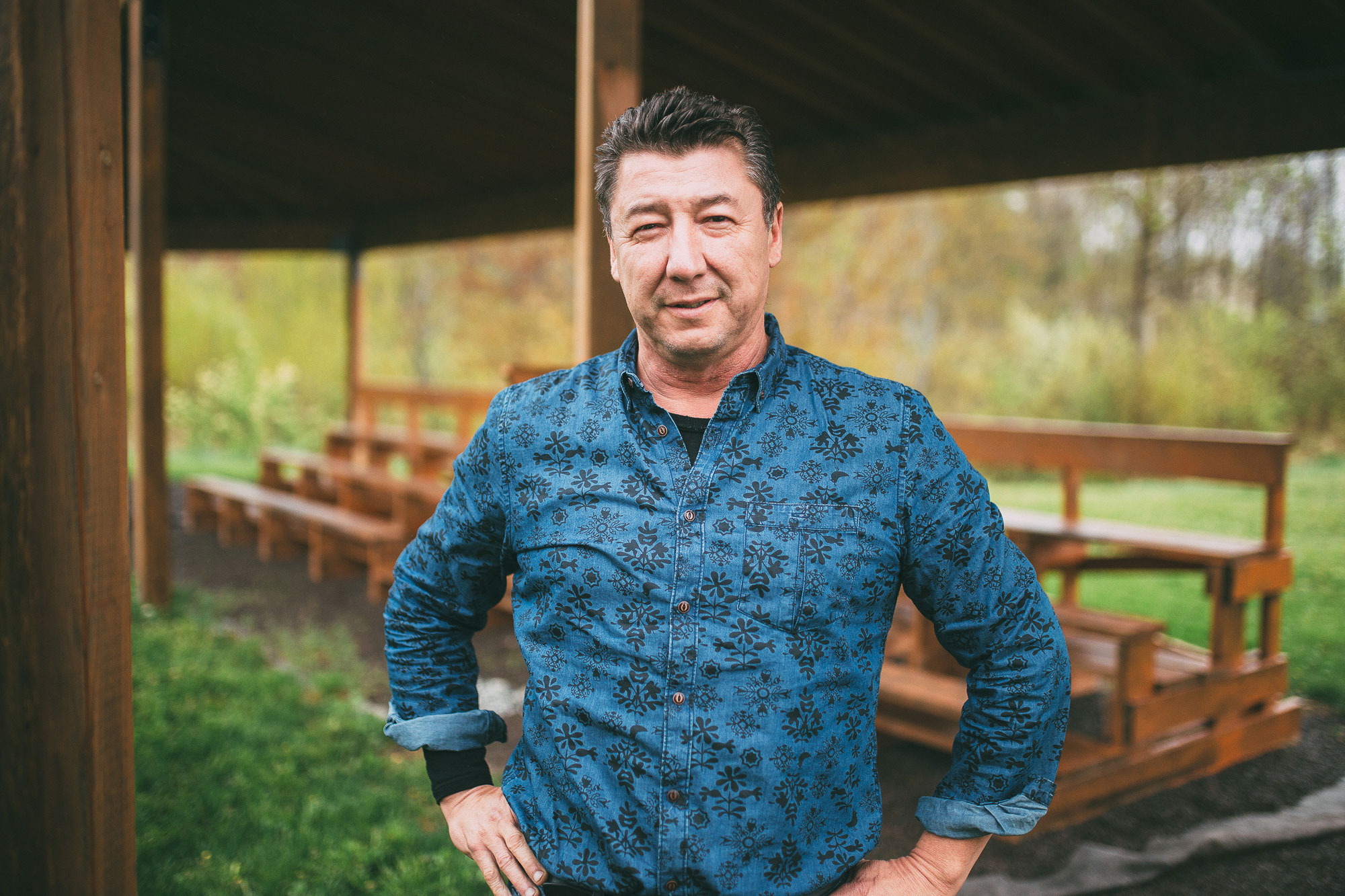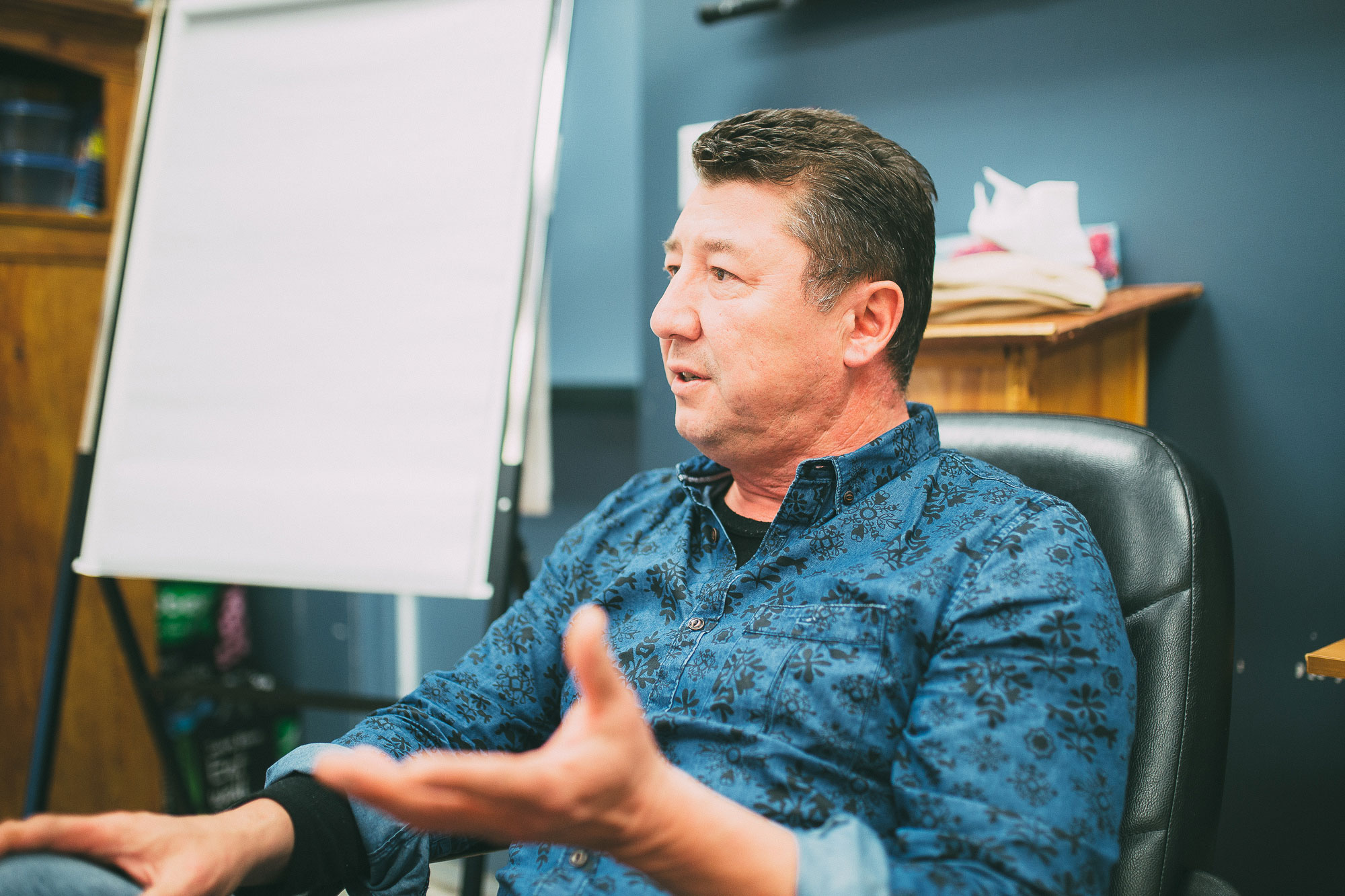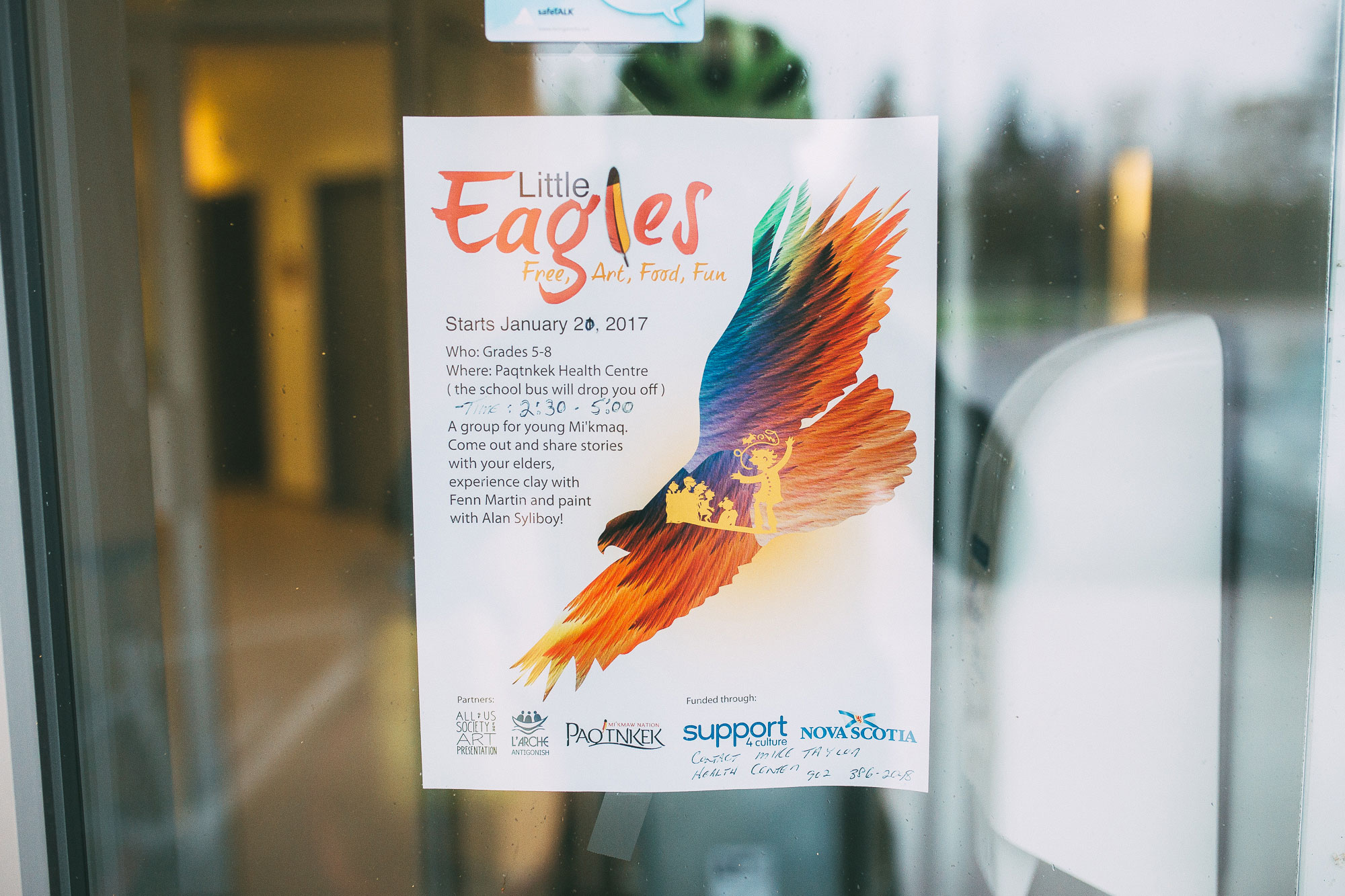When we reached the exit off the Trans-Canada Highway, the rain had been falling on mainland Nova Scotia for a couple hours. Vehicles spun up a 100-km/h mist of water and gravel, passing with an ever-present roar of wet tires on asphalt. It was a mild relief to get onto the relative peace of the small highway to Paqtnkek Mi’kmaw Nation.
“Ke’Kijka Naqata’q Wjit Mij’uajijk,” the first sign in the community read. “Slow Down For The Children.”
We met Paul in the Paqtnkek Health Centre, where he had just finished a meeting. He shook our hands, offered us a hot drink and then continued working away on paperwork while we took off our wet gear. “We’re honoured that you’re in our community,” he said as we started recording, “and that you’ve sought out Indigenous people to have a discussion.”

Paul introduced himself, and with that introduction came an acknowledgment of the history he carried with him.
“We have a long history on this land, within this traditional territory known before concepts and terms like Canada and Nova Scotia. We refer to our traditional territory as Mi’kma’ki.”
As he started describing the demographics of Paqtnkek Mi’kmaw Nation, he described an important part of their culture as well. “Community is not a physical place,” he said, “but a spirit that exists within the hearts of the people.”
That community spirit wasn’t just something he mentioned casually, but something that he carefully supported. He talked about collectively building a community with everyone around him, and the importance of a sense of spirit within Aboriginal communities. “What it suggests to me,” he said, “is this knowingness that we are together for a specific reason. There’s a reason why we come together as community, there’s a reason why we are here as Mi’kmaq people.”
Later on, he described marriages and death ceremonies and mawio’mi, pow wows, as occasions that the community visibly came together. “You see youth helping elders, or you smell the sweetgrass each morning after someone smudges the office here, and you feel it. You feel who we are.”
This was connected to his role as Chief, in which he saw himself holding that vision, building resilience in his community and progressing forward so that the youth of the future could take it even further.
“I view myself as playing a role along that way of progression towards a vision of community and nationhood that reflects the fundamental values and principles of who we are as Mi’kmaq people. I find my role as a Chief is to hold that space and to hold that vision.”
“But leadership is beyond the position,” he pointed out, “and there are many leaders in our community.” We didn’t talk in detail about who those leaders were, but I found myself thinking about the Katarokwi Grandmothers’ Council in Kingston, Ontario, who were and are acting as powerful leaders, as sources of culture, wisdom and inspiration.
This kind of leadership becomes all the more striking when it’s set in the context of colonization.
Paul’s description of various tools and consequences of colonization that his people had faced was a familiar story, but it’s one that always bears repeating. Centralization. Resettlement. Enfranchisement. Assimilation. Residential schooling. “You get that approach with the government, that they have to ‘deal with the Indian problem.’”
“Those were rough times of non-recognition, of being deprived of our cultural rights, spiritual rights, our rights to lands and resources, being disposessed of our traditional lands and placed on these small reserves. Those are some of the things that we live with, but I say that not to draw, you know, to look at this. When I think about it, I think about the resilience of Aboriginal people and the pride that we exhibit on a day-to-day basis. With that pride and strength and self-knowledge and recognition, I see what I classify as a rebirth of Mi’kmaq identity.”
“Just look at what we did as a people, and how resilient we are, to still be here today despite the history that we went through.”
Paul acknowledged that challenges between Aboriginal and non-Aboriginal communities exist, but also described a path to foster a sense of understanding between them as neighbours. He spoke of a need to improve that relationship in a way that is respectful and honourable about the role that Aboriginal peoples have played in Canada’s history. “Certainly in early relationships, the Mi’kmaq played a pivotal role between two competing nations, the French and the British, through alliances that were made through treaties. [In the past] there was a certain recognition of that relationship.”
The power of the past, of course, is that it shapes the present. One of the moments in which this was most powerfully clear was Paul describing, with tears in his eyes, an experience of looking at himself in the mirror as a young man.
“I remember looking at myself for quite a while and thinking, you’re nothing abut a dirty Indian.”
It’s hard to put into words the feeling of watching a grown man with kind eyes and greying hair, a professional lawyer and veteran Chief, a proud Mi’kmaw, get choked up talking about how much he once hated who he was. It was a weight like bricks.
A weight that was lifted by Paul’s description of youth in his community and in other Indigenous cultures.
“There’s no doubt in terms of the role of youth and the strength and power of youth, in terms of them seizing their identity and basically acknowledging and embracing their spirit. Their spirit individually, but also the spirit of a people, of a nation.”
When he spoke of youth he referred to a momentum of change, the idea that change was inevitable and that it was to be embraced and acknowledged. “Within the community, there’s a generation that is rising up from the youth, […] bringing new visions and approaches and ideas.” He said his role as Chief and as an adult mentor is to create a path where they can grow and prosper, and get into the things that reflect their true purpose and identity.
“That will be contagious.”
Paul explained that he often tries to think of opportunities for youth to grow and take on leadership, and tries to be cognisant of where the youth in his community are at, to take into account their needs. “One of the things that keeps me up at night is the complexity of drugs and addictions. When I was young, there wasn’t that many things to be really addicted to, but nowadays the list goes on and on. You’re really waiting for the next drug fentanyl to come around, and what are we going to do about that? To ensure that there’s proper supports within communities.”
I’m not quoting that to connect the youth in Paqtnkek Mi’kmaw Nation to drug usage. As an educator, nearly every adult I know who works with young people is aware of and concerned about drugs like fentanyl, so it was impactful to hear a Chief speak clearly and authentically about it and the ways he tries to watch out for the youth in his community.
Paul also described the importance of tradition in Paqtnkek Mi’kmaw Nation, both the revival of old traditions and the creation of new ones. “New ceremony will get us where we need to go. […] There’s often a balance to respect and honour tradition, to value it for what it means to us as a community and as a nation. But on the other side of the balance is the need to create new tradition.”
An example of an old tradition being revitalized was the concept of netukulink, which doesn’t really have a good translation into English. It’s a concept that emerged from the coexistence between the Mi’kmaq and sitkamu, their earth mother; a way of not only looking at their right to the land but also their responsibility to care for it. “It is like a sacred trust. That translates into the manner by which you function within nature, within the environment, within this wonderful place.”
The last portion of our discussion with Paul included two explicit lessons that I want to conclude by sharing. In the context of Canada 150, he spoke of Indigenous youth taking on the power within themselves.
“I guess if there’s one thing that I’d like people to think about is the power in who they are. We are all powerful creators. The more people that people come to realize that and strive for that, the better off we will all be, not just as Mi’kmaq but as Canada, 150 years from now.”
I asked what lesson or teaching he would share if other Aboriginal or non-Aboriginal people were listening, and his answer, after a moment of thought, was just two words: Honour thyself.
“Honour who you are, where you come from. Honour your relationship to this beautiful earth, and your role within it. Honour the authority and sovereignty you have as an individual; through the power of your creations, through what you say, what you hear, what you feel.”
“If there's one thing this community has ever taught me, it's about honour.”


Thanks to Asad for asking many of the questions and recording the audio.